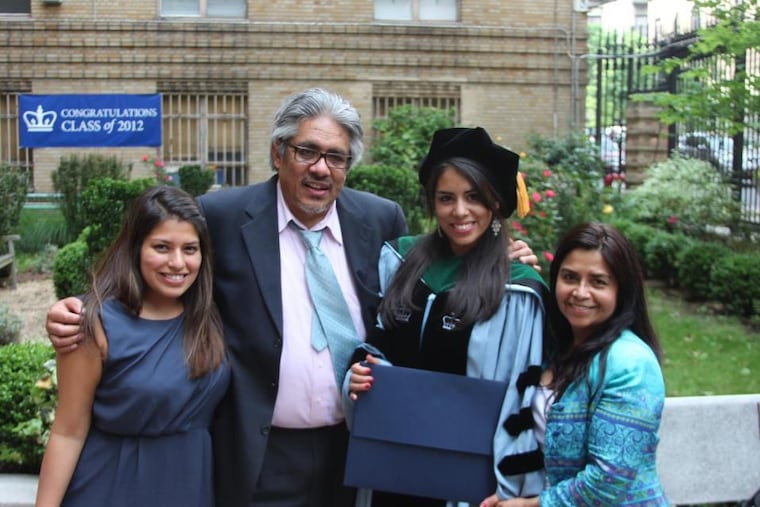Mixed-status immigrant families have complex health insurance needs that require simple solutions | Expert Opinion
Pennsylvania public officials should prioritize outreach strategies to educate residents that seeking health insurance for a child will not negatively impact the immigration status of anyone in that child’s family.

Five years ago, the number of children without health insurance in the United States reached a historic low, dipping below 5%. I was a new pediatrician and mother at the time. I distinctly remember feeling this was a sign of prosperity for the country my son would grow up in. Sadly, rates of uninsured children have been on the rise since then, including here in Pennsylvania, where we have the eighth-highest number of uninsured children in the country. Nationally, the rise has been particularly sharp for immigrant children, including those who are U.S. citizens.
This is an issue that hits very close to home for me. I was a member of a mixed-status immigrant family long before I first heard the term. My parents and I were born outside of the United States, whereas my sister was born in this country. She was a citizen by birth many years before my parents and I became naturalized citizens. At one point, we all had a different “status.” Families like mine are remarkably common. One in four children in the U.S. have immigrant parents, and nearly 90% of children in immigrant families are citizens.
And yet these families, in which some family members are citizens and some are not, face a unique set of concerns, which I hear firsthand as a pediatrician:
“If my medically complex son stays on Medicaid, will we lose our chance for his grandmother to become a legal permanent resident?”
“If I sign up my newborn daughter for health insurance, will that mean I can’t become a legal resident, or worse, get deported and separated from her?”
These heart-wrenching questions lie at the root of the problematic trends we are seeing in the landscape of children’s health insurance coverage. In 2019, 8% of citizen children with noncitizen parents were uninsured compared with 4% of citizen children with citizen parents. Children in immigrant families face many barriers to health-care access, regardless of their own documentation status. Insurance for children is becoming increasingly unaffordable for families, with rising premiums and out-of-pocket costs in the commercial insurance market. For those looking to buy a plan through the Affordable Care Act marketplaces for their citizen children, undocumented immigrant families cannot receive the generous premium subsidies offered there. Finally, the Trump administration instituted many barriers to public benefits, including the public health insurance programs that are so important to children and families.
There has also been increasing evidence that immigrant families are choosing not to enroll their children in Medicaid or the Children’s Health Insurance Program (CHIP), or are even unenrolling them. This is in large part due to the 2019 public charge rule, which dramatically expanded criteria to disqualify someone from gaining legal entrance into the United States or obtaining a green card.
Thankfully, the expanded criteria were in effect for only a short time before they were rescinded, a welcome step given the ample evidence of the harm these changes were having on public health. Notably, enrolling children in Medicaid or CHIP was never part of the public charge rule changes, but the continually shifting legal status of the rule and the major way this complex issue made its way into public discourse were enough to cause significant fear, confusion, and misinformation in immigrant communities.
Thus, Pennsylvania public officials should prioritize outreach strategies to educate residents that seeking health insurance for a child will not negatively affect the immigration status of anyone in that child’s family. The Biden administration recently asked for public comments on how to better define a “public charge” moving forward, which means there may be new rules emerging in the near future about what public charge means in this country. Such announcements have the potential to create yet another wave of misinformation among immigrant communities. State and local governments should, therefore, incentivize targeted, preemptive public health messaging around this issue.
I fundamentally believe all children living in this country should have health insurance, and ensuring this through legislation would accomplish multiple goals at once. Expanding insurance coverage to all children who live in our state — regardless of documentation status — would decrease confusion among mixed-status families, reduce administrative burden and costs associated with the verification of different eligibility requirements within families, and save public health dollars. Several states have taken major steps toward universal children’s coverage, including New Jersey earlier this year. Here in Pennsylvania, undocumented children continue to be excluded from public health-care coverage despite growing support for the Dream Care campaign working to cover all kids.
I want to make sure that in families such as mine, parents do not have to worry whether enrolling one child in Medicaid would prevent that child’s sibling from one day becoming a citizen. The good news is that there are legislative and programmatic policy approaches to optimizing health insurance coverage — and ultimately health — among all children who live in our state. Investing in such policies would pay dividends toward a future of prosperity here in Pennsylvania, and nothing would make this pediatrician and mama happier.
Dr. Diana Montoya-Williams is a faculty member at PolicyLab at Children’s Hospital of Philadelphia, an assistant professor in the department of pediatrics at the University of Pennsylvania, and an attending neonatologist at CHOP.